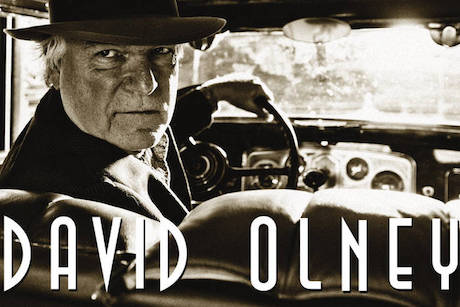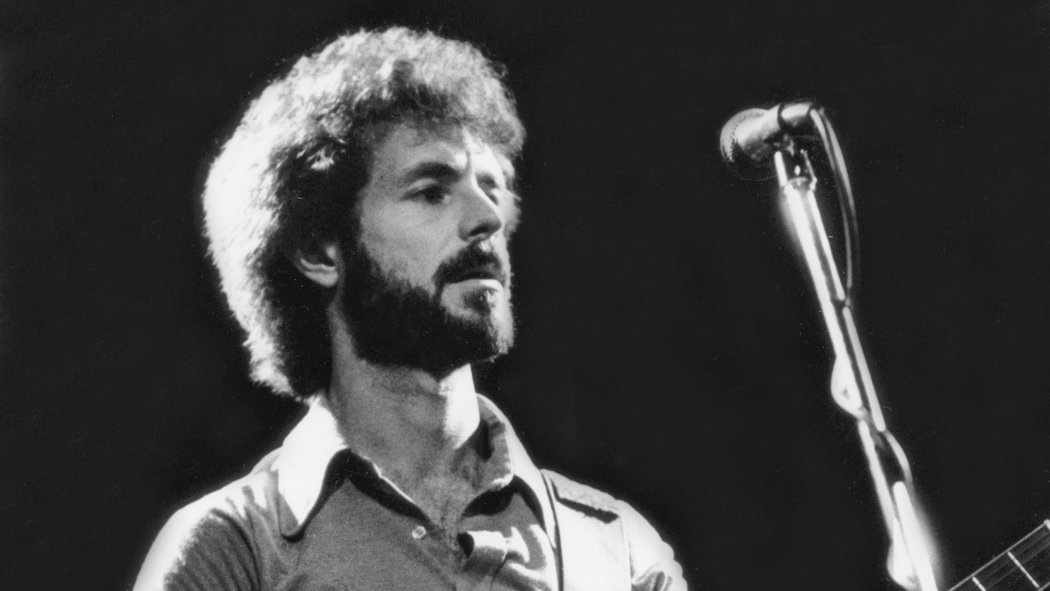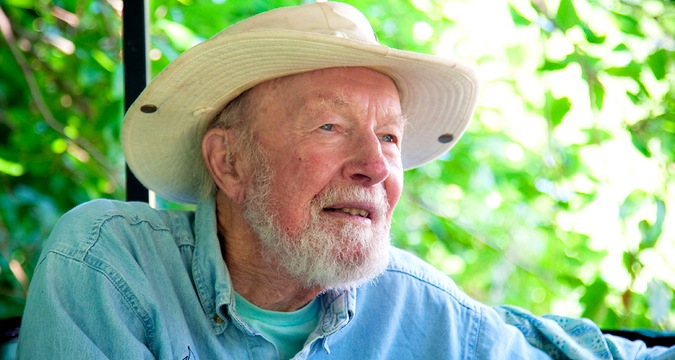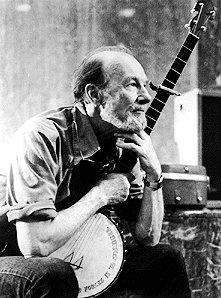RIP David Olney (1948-2020)
A songwriter’s legacy, covered in folk

It’s hard not to write about David Olney without name-dropping. When the 71 year old touring folk musician and “founding father of Nashville Americana” died quietly on stage during a performance this weekend, the world lost a songwriter’s songwriter, known at least as well in the deeper branches of the folk and bluegrass worlds for his collaborative work with Steve Earle, Del McCoury, Tim O’Brien, and Emmylou Harris as for his ongoing work as a touring and recording artist in his own right, on the circuit since arriving in Nashville in the early seventies. The bluegrass and folkhouse labels on which others have released recordings of his songs mark a strong pedigree: Rounder, Sugar Hill, Compass, Philo, Red House. And the tributes pouring forth on social media in the last few days from those who worked with him, and had plans to work with him, are a veritable who’s who of the modern folk circuit: Mary Gauthier, Amy Rigby (who was onstage with him when he passed), Amy Speace, Alejandro Escovedo, Ellis Paul, Abbie Gardner, Tom Russell, Janis Ian, Cheryl Prasker, Tom Pradasa-Rao, and more.
What made Olney’s life’s work so special? Townes Van Zandt, famously – a contemporary, though it’s harder to remember when talking about artists who died young – once listed Olney as one of his top four songwriters, next to Mozart, Lightnin’ Hopkins, and Dylan. Others describe the joy of working together, collaboratively, or being in the round with him on stage, learning from a humble master. Mary Gauthier, on her personal page, notes especially his masterful choice of perspective and point of view – reconsidering the story of Jesus from the perspective of the huckster ripping people off on the next hill over, looking at the effects of WW I on soldiers from the viewpoint of a French Prostitute in 1917 – even taking on the sinking of the Titanic from the point of the iceberg, which lends a chilling randomness to death and movements alike.
Whether performing his own songs, or handing them off in whole or part to others, David Olney’s ability to take on the vivid voice of the peripheral, the powerful, the frustrated and the villainous to reveal the gritty reality of the masses was unparalleled. Today, a short list of covers, performed by contemporaries and inheritors alike, in thanks for his graceful presence – in the music, and in the lives of those he touched.
- The Wailin’ Jennys: Deeper Well
- Beau & Luci: Deeper Well
- Vassily K.: Deeper Well
- Gary Peters: Deeper Well
- Hobnail: Deeper Well
If David Olney was a household name at all, it was at least in part due to his co-write on this famous track from Emmylou Harris’ turning point album Wrecking Ball, which marked a transition in her career from Country sweetheart to an artist at the forefront of the new, lush Americana. Though Olney had recorded it several years earlier, later covers of the song – Olney’s most covered, surely – generally took on Harris’ arrangement with Daniel Lanois, and attribute the song to Harris herself; of these, several stand out: The Wailin’ Jennys‘ high-energy live harmonies, for sheer energy and beauty; Gary Peters‘ false-start banjo droner, for its slow build to mysticism; Russian bouzouki player Vassily K.’s picker’s melodrama; the military drums and country slide New Zealand roots quartet Hobnail bring to the table before slamming the thing wide open…and the only Olney cover we’ve posted here before, a tense 2017 Year’s Best Single from new-age indie-folk siren sisters Beau & Luci.
Slaid Cleaves‘ out-of-print 2006 covers album Unsung is a corrective: a song-by-song tribute to artist “friends and colleagues” in the scene whose names are not household names, but should be. Cleave’s dark, dusty take on Millionaire offers a perfect exemplar of Olney’s ability to inhabit and expose the fundamental evils of power without transforming the powerful into antiheroes; the smug braggadocio in this litany of exploitation and excess comes through loud and clear in Cleaves’ gruff, slightly queasy style – a counterpoint to the deceptively mellow, lighthearted cheer Laurie Lewis and Tom Rozum brought to the same song almost a decade earlier.
Originally covered by a world-weary Linda Ronstadt and Emmylou Harris on their sweet, stripped-down 1999 duo album Western Wall: The Tucson Sessions, nestled comfortably alongside equally tender takes on songs by Springsteen, Patty Griffin, Sinead O’Connor, Leonard Cohen, and Jackson Brown. Seattle singer-songwriter and Irish traditionalist Erin McNamee‘s Celtic-tinged version, from her delightful 2010 album Whores and Fishermen, recasts the song as even more whispery and wistful – tender, even, with nary an ounce of bitterness, a whore truly mourning the soldiers who have shared her bed.
Olney’s recognition transcends borders, for sure. Though If My Eyes Were Blind was famously covered by both Steve Young and Mimi Farina in the eighties, I’m quite fond of these two takes, from prolific Netherlander singer-songwriter Ad Vanderveen and equally prolific amateur Finnish ukelele Youtuber Old Gardner Guy – the first lush and more tuneful, the second torn and ragged; both serve the longing achingly.
A cowrite with Sony staff songwriter and indie label founder Carol Elliott, whose 1995 recording of the song live from Kerrville seems to be the only official recording available, Mae Robertson‘s luxurious dreamland cover evokes the sweeter side of Olney, in partnership – one we hardly ever saw enough: the gentle, simple lullaby-crooner, sensitive to the language of love, with tender, assonant tonality, reminding us that it takes a true understanding of comfort to show it any any distance, even – perhaps especially – up close.
There’s nothing beautiful or lyrical about this pair. The original Love’s Been Linked To The Blues, off 1991 release Roses, is a pretty straightforward loose acoustic shuffle-blues, complete with trumpet solo, telling a familiar if unusually literate story of what love drives us all to, eventually, in “I saw it on the news” virus-tracking format; Garnet Rogers kicks it up a notch to electric barroom slide, a growlin’ and a moanin’. And fellow Nashville denizens Kieran Kane and Kevin Welch bring a hollow resonance to the core cautionary tale of Postcard From Mexico, a solid electrofolk groove about a dangerous woman and her aftermath officially released around the same time as Olney’s version.
- Linda Ronstadt: Women ‘Cross The River
- Ronstadt Generations Y Los Tucsonenses: Women ‘Cross The River
A masterpiece of structure, borrowed from a Chinese poetic form in which the first and second couplets in each verse trade off disparate storylines, coming together with one story image as metaphor, resolution, or counter-image for the other in line five. The juxtaposition of wise and (deceptively) gentle women in the distance and the close-by folly of building bulwarks against the ages is as wise and poetic as Ozymandias – and the device of externalization sublime, in both Linda Ronstadt‘s contemporary folk-ballad retelling, and her brother and nephews‘ jazzed-up reconstruction.
Two years before Wrecking Ball broke the mold, Emmylou recorded another of Olney’s compositions as a decidedly more dustbowl country talksong, showing roots close to Townes’ – at least until the clarinet kicks in, that is. Bluegrass balladeer James King takes the tale of a desert huckster trying to figure out Jesus’ angle up to a drawling tenor, at the top of his range, and the strain fits the song perfectly. Mary Gauthier posted the lyrics to this one over the weekend in tribute to Olney’s passing. Great choice, Mary. We’ll miss you, David.
Always ad-free and artist-centric, Cover Lay Down has been digging deep at the ethnographic intersection of folkways and coversong since 2007 thanks to the support of artists, labels, promoters, and YOU.
So do your part. Listen, deeply. Follow the threads. Purchase the music you love, and in doing so, support the arts and the artists in their struggle to thrive and survive.
And if, in the end, you’ve got goodwill to spare, and want to help keep the coverfolk flowing? Please, consider a contribution to Cover Lay Down. All gifts go directly to bandwidth and server costs; all donors receive undying praise, and a special blogger-curated gift mixtape of well-loved but otherwise unshared covers from 2018.





 The son of an ethnomusicologist and a true believer in folk as a mechanism for tying past to future, perhaps more than any artist in history, Seeger lived folk song as if it truly did belong to the community for which it speaks. And although this practice was occasionally dismissed as a form of cultural disrespect, it is this, as much as his songs, which may well prove to be the longest lasting of his influence.
The son of an ethnomusicologist and a true believer in folk as a mechanism for tying past to future, perhaps more than any artist in history, Seeger lived folk song as if it truly did belong to the community for which it speaks. And although this practice was occasionally dismissed as a form of cultural disrespect, it is this, as much as his songs, which may well prove to be the longest lasting of his influence. 